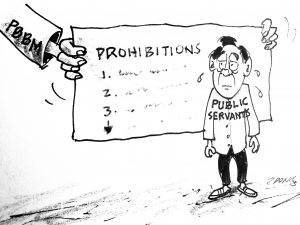In his recent address to public servants, President Ferdinand Marcos Jr. meticulously enumerated his prohibitions, apparently showcasing his strong commitment to integrity and transparency in governance. He hinted at the potential pitfalls and temptations that public officials may encounter and his vision for a government that prioritizes public interest above personal gain under his Bagong Pilipinas campaign.
His prohibition of graft and corruption underscores his desire to eradicate these long-standing issues that plague many governments worldwide. He stressed that public servants must not engage in any form of bribery, embezzlement, or misappropriation of funds, as these actions undermine trust in the government and rob the citizens of the resources meant for their welfare. He strongly conveyed that such actions are not tolerated under his administration.
He also detests nepotism and favoritism within the ranks of public service. Recognizing that these practices breed resentment and hinder meritocracy, he insisted that appointments and promotions should be based solely on qualifications and achievements. This prohibition promotes fairness, efficiency, and effectiveness within the public sector, ensuring that only the most competent individuals are entrusted with key positions and responsibilities. But sadly, nepotism is still rampant in government agencies within our region.
Furthermore, PBBM banned public officials from using their positions for personal gain or enrichment. He stressed the importance of maintaining integrity and avoiding conflicts of interest, urging public servants always to prioritize the welfare of the people they serve. By limiting opportunities for corruption and self-enrichment, PBBM pushes for a government that is truly dedicated to uplifting the lives of its citizens and fulfilling its duties with utmost sincerity.
His prohibitions on public servants demonstrate his commitment to establishing a government of integrity, accountability, and transparency, but it takes so much conscience for appointing officials to heed that call, despite their duty to uphold the highest ethical standards and act in the best interest of the public. We hope PBBM’s vision for a corruption-free government and a service-oriented public sector will deliver positive change and improve the lives of the people it serves.




